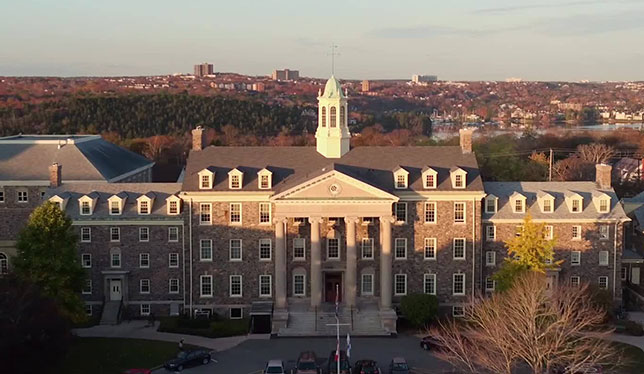8 ways Canadian academics can resist Trump
Educate yourself, embrace activism, donate your time, and more.

In an ideal world this would go without saying: the Trump administration and the policies it is currently advocating are unacceptable. The racism, xenophobia, transphobia, sexism, climate-change-denialism, nepotism, corporate cronyism and militarism emanating from the U.S. threaten global stability, but particularly portend strife in Canada. Because of our physical and cultural proximity to the U.S., I contend that we have a moral responsibility to resist the administration and its detrimental dictates.
As many others have argued, academics have a unique privilege and responsibility to be “dangerous to the state” as we shape political consciousness in students and steer debates in classes, and in our published work. What I advocate is neither a “meddling” in another country’s affairs nor a narrow leftist political agenda. Instead, I wish to underscore the recognition that in our increasingly interconnected world, powerful nations’ policies have truly global implications. Racism and deepening levels of social injustice in the U.S. should not be ignored simply because they are “over there” across the border.
While there are a range of tactics Canadian academics can take to de-normalize and fight the Trump administration’s misguided policies, I’ve built on a number of resources to offer eight strategies to guide future collective activism.
- Educate yourself while educating your students. Embrace critical and radical pedagogy to de-normalize Trump’s historically resonant brand of populist nationalism. Assign difficult, charged readings that take a stance against injustice. Make clear to your students that this trend is a threat to Canada and the rest of the world. There are plenty of fantastic popular press articles that can be incorporated into both undergraduate and graduate classrooms.
- Embrace public scholarship and scholar activism. In your research, mentoring, service, outreach, publications and related scholarly endeavors, connect your work to public policy, activism and social justice. Explicitly foreground your work’s public impacts. Without exception, disciplines across the spectrum of the university conduct work that is relevant to what’s happening south of the border. Publish politically charged, politically impactful articles; if you have tenure, use the protections afforded by that privilege. In addition to traditional academic journals, speak out in public forums such as the popular press, periodicals, workshops and city hall meetings.
- Host a research-a-thon. Earlier this year, the Schulich School of Law at Dalhousie University conducted a day-long session researching the legal intricacies of the Trump travel ban; this produced important guidance for Canadians impacted by the order or federal support for science research. Web designers, software engineers, digital humanities strategists and others can employ their technical capacities to effectively communicate research-a-thon outcomes. Connect your disciplinary knowledge to the university’s strong interdisciplinarity.
- Leverage Canada’s trade partnerships. Call or visit in person the offices of your MPs, local councilors and other government representatives to leverage Canada’s U.S. trade partnerships against Trump policies. Canada is a powerful trade partner and accordingly wields a significant bargaining chip. Whereas representatives may be attuned to more traditional political appeals, gesturing toward Canada’s trade relations may initiate a novel source of public pressure.
- Donate time, expertise or resources. Donations take many forms beside financial funds – time or expertise can be volunteered in courtrooms or media interviews; identify resources your institution can offer, such as web hosting; organize student work-groups to contribute to organizations’ missions. Balance donations to local organizations with national and international organizations. The long list of organizations in need include Idle No More, the Center for Reproductive Rights, Showing Up for Racial Justice and the Natural Resources Defense Council. As well, the media are under siege by the Trump administration, and supporting a free press is more important than ever. Thus, I can also list Democracy Now!, your local newspaper and ProPublica. (Note that financial donations to U.S. institutions are not tax-deductible.)
- Amplify marginalized voices – and know when to give someone else the microphone. Accentuate voices of immigrants, people of colour, LGBTQ folks, the geographically marginalized and the impoverished. Share their posts on social media. Read their writing and bring them up in conversations inside and outside the classroom. Design course outlines, assignments and in-class activities that incorporate them. Prioritize them in hiring. Involve them in panels, roundtables and discussions. Collaborate with them. Bolster them. Sometimes this means being quiet and listening to what others have to say.
- Create platforms for radical ideas. Organize speaker series, film screenings, colloquia, visual arts exhibitions and more, inviting politically impactful thinkers and voices. We must repeatedly give a platform for radical speakers who will mobilize collective anger in productive ways. For example, in 2016 the University of Calgary hosted the “Big Thinking” lecture series (affiliated with the Congress of the Humanities and Social Sciences) in which Naomi Klein and Leroy Little Bear spoke. These efforts open new avenues for critique and praxis.
- Draft public policy proposals. In your everyday workflow, collect, analyze, visualize and produce data and information with clear streams into policy circles. Write proposals for your municipalities, provinces, regions and the nation to accept more refugees; to improve food, transportation and housing access; and to mitigate the negative racial, gendered and sexual implications of laws. Underscore the inalienable dignity of all humanity through think-tanks like the Canadian Centre for Policy Alternatives, the Broadbent Institute, the Parkland Institute and the Caledon Institute. Of course, this work becomes more viable with increased pressure on institutional tenure committees to value this mode of scholarship.
The next four years seem daunting, but our collective efforts can assuage the rising tide of nativism, misogyny, Islamophobia and environmental destruction.
Ryan Burns is an assistant professor in the department of geography at the University of Calgary. He’d like to thank several of his colleagues who gave their advice on the writing of this article.
Featured Jobs
- Business – Lecturer or Assistant Professor, 2-year term (Strategic Management) McMaster University
- Canada Excellence Research Chair in Computational Social Science, AI, and Democracy (Associate or Full Professor)McGill University
- Veterinary Medicine - Faculty Position (Large Animal Internal Medicine) University of Saskatchewan
- Psychology - Assistant Professor (Speech-Language Pathology)University of Victoria














Post a comment
University Affairs moderates all comments according to the following guidelines. If approved, comments generally appear within one business day. We may republish particularly insightful remarks in our print edition or elsewhere.
10 Comments
I would add, “Encourage and engage diversity (in it’s broadest of forms) throughout Campus.”
“What I advocate is neither a “meddling” in another country’s affairs nor a narrow leftist political agenda.” But then you cite resources that are all left leaning/progressive sources, some of which are funded by the likes of George Soros and Herbert Sandler, serial financiers of left wing causes. At least be honest about your bias.
Those on the radical Left can’t see how obvious their bias is to anyone within 2 standard deviations of normal.
While I would be delighted to (continue to) do many of the things that Ryan Burns suggests to minimize the influence of Trump in Canada, I am also concerned about home-grown elements of bigotry, bellicosity and bone-headed foreign policy.
From Kellie Leitch to Jason Kenney, Chris Alexander, Peter Kent, Andrew Scheer and (surprising to me since she seemed fairly moderate when appearing on CBC’s “Power & Politics”) Michelle Rempel, there is a very nasty streak in the Conservative Party that plainly has an appeal to some Canadians – not the 33% that forms Trump’s “base” in the US, but not a significant number nonetheless.
Even closer to home, I am increasingly worried about the corporatization of higher education, the pervasive market mentality, the commodification of curriculum, the monetizing of research, the degradation of the liberal arts and the denigration of critical thinking – not the critical thinking that’s become a buzzword in administrative discussions and that’s linked to “innovation” and “entrepreneurship” that are preferred to scholarship and civic enlightenment in managerial vision statements and brochures, but real critical thinking that involve the critique of existing social relations, emerging technology and the imminent ecological catastrophe that will become inevitable if we do not embrace authentic science and ruthlessly interrogate the dominant institutions in our society.
The key here is “academic freedom,” which (like tenure) is under attack in the universities, is rejected out of hand in the colleges (at least in Ontario, where the authorities refuse even to discuss it in the current round of negotiations with faculty at our 24 colleges), and is rendered meaningless for the three-quarters of faculty in postsecondary schools (adjunct, sessional, partial-load, part-time, contract or what you will) who have no job security and can be terminated – i.e., not rehired – without cause at the end of their semester-long contracts.
Increasingly, a cloud of timidity and understandable fear dominates the corporate culture of many institutions. This is the dark side of higher education, and it feeds the political culture of Trumpism which, again, is not restricted to the United States of America.
The role of the professor and post secondary education system is to educate students and encourage critical thinking and the cultivation of skills that will lead to better employment and improving society.
It is not the role of the professor to expound their political beliefs upon students, even if “they are correct”. Leave your biases and politics out of the classroom.
Just how much more damage do you intend to do to the beleaguered Humanities by encouraging us to join the anti-Trump echo chamber only to spout endless sound bytes of virtue-signalling? We need to teach students *how* to think, not *what* to think.
Mobilizing “collective anger” only leads, ironically, to the election of populists like Trump and to the philistine thuggery of Antifa. Identity politics is destroying the Humanities, and our students see right through it.
Thank you for writing your article and for sharing your resources.
In response to come of the comments below, which insinuate that challenging the Trump administration is akin to professors bringing their “bias and politics in the class room,” I think it’s important to remember that there is an actual difference between Sociology, a discipline that has researched and empirically verified the existence of systemic and structural oppressions in our society, and ideology. The Trump administration is of interest to Sociologists (and many other academics in the Social Sciences) because understanding its advent intertwines significantly with the subject matter we teach. And challenging the misinformation and misconceptions that have fueled the Trump presidency and exacerbated social marginalization is part of the teaching process (and is also a means for “improving society,” unless of course one does not think social inequality is a problem.) Finally, don’t confuse being objective with being bipartisan or apolitical.
I’m sure the Trudeau sunny populism will be left free of criticism in curricula, because it conforms to the Objective and Correct Way of Thinking. This article and your post lead credibility to claims of universities being breeding grounds for only one type of ideology.
Criticising the Western world, Christianity, people with white skin etc. is simply a safe manner of virtue signalling. Of course most cultures and societies who kill and oppress religious, LGBTQ and other minorities are exempt from critique because, “who are we to judge them”.
I hope you realise this type of thinking and approach to “education” is only encouraging the extreme right sentiment.
Burns gives away the entire academic game in his very first sentence when he declares wholesale that the entirety of the Trump administration and its plethora of policies are all unambiguously “unacceptable,” and then wishes that there were not even a need to argue the point. I learned as a humanities undergraduate that very little in the world is as it appears to be and that very little can be judged as exclusively good or bad. I then became a humanities scholar because I relished the prospect of trying to understand and argue the complexity and nuance of human affairs. If Burns (and countless others like him) think education ought to be indoctrination in blunt, absolutist platitudes where the burden of proof is unnecessary, they would be more happily employed in a place like North Korea.
Please, University Affairs, consider publishing articles from other political persuasions now and then.
I could not agree more! Imagine someone saying, “In an ideal world this would go without saying: the Harper government is great”, and seeing how that flies in the academic crowd.
It is not your duty to indoctrinate students with your socio-political beliefs. I wonder how often Burns talks about Saudia Arabia and other similar countries in his lectures. Probably not often!